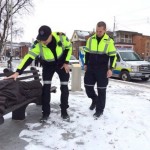The other cities listed in its “hall of shame” are in Hawaii, Texas and Washington state.
People in Denver chanted, “No handcuffs. Give us homes,” as they packed up their belongings when police arrived. As they piled shopping carts high, a jumble of items cluttered the area: a banana, a paperback copy of Shakespeare and a pair of construction boots.
Many cities with increasing home prices have been struggling with homelessness, including Denver and Honolulu, which were reprimanded for an anti-camping law and ban on sitting or lying on sidewalks, respectfully.
Maria Foscarinis, the center’s executive director, said:
These laws are unconstitutional and bad public policy. Homelessness remains a national crisis across the country. It’s fueled by the growing lack of affordable housing and the shrinking safety net.
The report, which was based on a review of policies enacted by 187 cities over a decade, said bans on living in vehicles increased by 143 percent. Those laws can be particularly devastating because they often lead to vehicle impoundment, and people can lose all of their belongings, disrupting their ability to work or attend school.
In Denver, authorities had given notice that homeless people had to move their things. While some packed up and left, others resisted, so the city gave them more time, said Julie Smith, a spokeswoman for the human services department. She said the city wants to help them go to shelters and get other services.
Bennie Henley, an Army veteran who moved to Denver two weeks ago from Kansas to get treatment at the Veterans Administration hospital, said he prefers sleeping on an advertising banner rolled out on the sidewalk rather than in a shelter. He showed a rash on his arm that he thinks came from bedbugs in a shelter.
“I don’t like being crowded up like that,” said Henley, sitting on a swivel office chair on the sidewalk and leaning on a cane.
Denver forces thousands of people to dismantle camps despite a waiting list for subsidized housing.
Honolulu was criticized for what the report called aggressive enforcement of its sit-lie ban. The group said the city has issued more than 16,000 warnings to people violating the ban since it was enacted in Waikiki in 2014.
Since the sit-lie law took effect in September of 2014, officers have issued 21,630 warnings and made only 27 arrests after a public education and warning period. Over the last two years Honolulu has helped house more than 1,000 people who were experiencing homelessness, including over 860 veterans.
The report also targeted Dallas and Puyallup, Washington. Dallas was criticized for issuing thousands of citations for sleeping in public, and Puyallup, for making it illegal to camp, panhandle or sit and lie down in parts of the city, despite lacking adequate space in an emergency shelter. Officials from those two cities didn’t immediately respond to requests for comment.
The report called several such policies unconstitutional. The group said panhandling is protected by free-speech rights and preventing sleeping in public could be considered cruel and unusual punishment.
© Humane Exposures / Susan Madden Lankford










